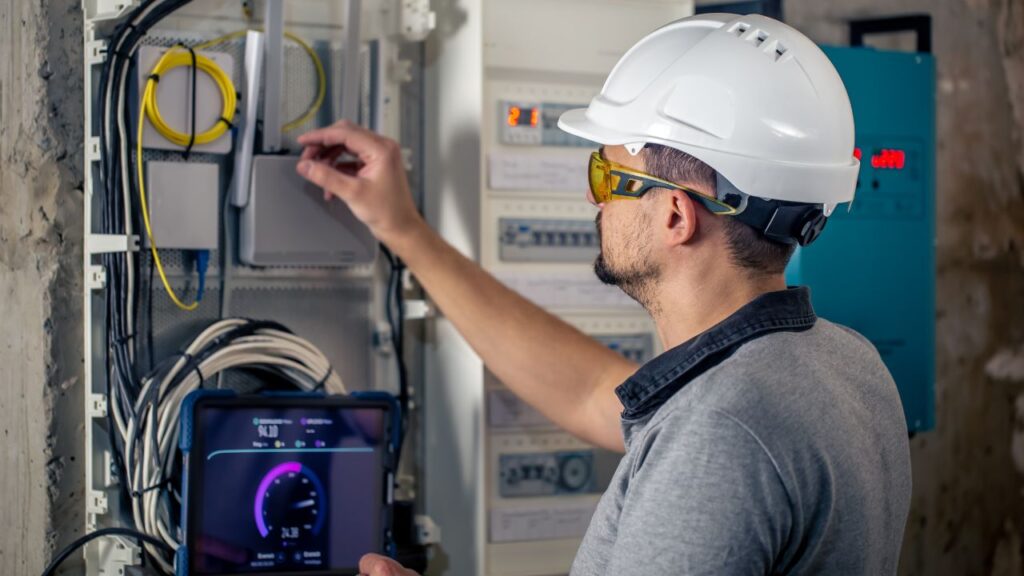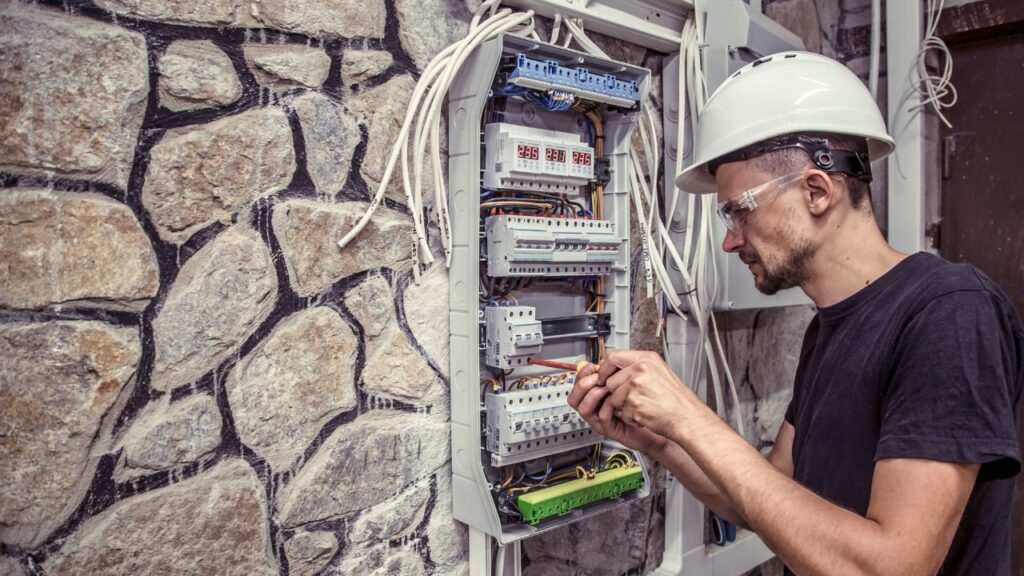A Wining Cost Estimate
That Helps You To Win More Electrical Projects

Estimating project costs accurately is a crucial aspect of electrical construction. Whether you are working on a residential, commercial, or industrial project, having a comprehensive understanding of cost estimation techniques is essential. This guide will provide you with valuable insights into electrical project cost estimation, enabling you to make informed decisions for your next endeavor.
Electrical project cost estimation involves determining the financial resources required to complete a project successfully. It plays a pivotal role in project planning, budget management, and overall project success. By accurately estimating costs, project managers can make informed decisions, allocate resources effectively, and minimize financial risks.
Cost estimation holds significant importance in electrical projects due to various reasons. Firstly, it helps stakeholders understand the financial feasibility of a project. It assists in determining whether a project can be completed within the allocated budget. Additionally, accurate cost estimation enables project managers to secure funding, negotiate contracts, and make realistic project commitments.

Several factors influence electrical project costs. These include:

Before starting the cost estimation process, it is crucial to gather essential project information, identify project requirements, and analyze the project scope. This preparatory phase ensures accurate cost estimation and minimizes the chances of unforeseen expenses.
Begin by collecting all relevant project data, including architectural and engineering drawings, project specifications, bills of materials, and any other documentation related to the project. This information forms the foundation for the cost estimation process.
Clearly define the project requirements, including the scope of work, desired outcomes, and specific project objectives. Understanding the project's purpose and goals helps in determining the appropriate cost estimation techniques and resources required.
Thoroughly analyze the project scope, considering all tasks, deliverables, and milestones. Break down the project into manageable components to ensure accurate estimation of costs at each stage.
Electrical project costs can be categorized into several types, including:
Material costs involve the expenses associated with procuring electrical components, cables, wires, fixtures, and other necessary materials. Accurately estimating material costs requires detailed knowledge of the project requirements and market prices.
Labor costs encompass the wages, benefits, and allowances for the workforce involved in the project. Estimating labor costs involves considering factors such as the number of workers, their skill levels, hourly rates, and the project timeline.

Electrical projects often require specialized equipment such as testing devices, generators, lifts, and power tools. Estimating equipment costs involves considering rental or purchase expenses, maintenance costs, and the duration of equipment usage.
Overhead costs include administrative expenses, insurance, permits, licenses, and any indirect costs associated with the project. These costs are essential to consider for accurate overall cost estimation.
Maximize your electrical business’s potential with our competitive financing options

Several techniques can be employed for electrical project cost estimation. Each technique has its own advantages and is suitable for different project scenarios. Some commonly used techniques include:
Analogous estimating involves comparing the current project with similar past projects and using historical data to estimate costs. This technique is useful when limited information is available or when there is a need for a quick estimation.
Parametric estimating involves using statistical relationships between project variables to estimate costs. This technique utilizes mathematical models based on historical data and project characteristics to derive cost estimates.
Bottom-up estimating involves estimating costs for individual project components and then aggregating them to determine the overall project cost. This technique provides a detailed and accurate estimation but can be time-consuming.
Three-point estimating involves estimating costs based on three scenarios: the best-case scenario, the worst-case scenario, and the most likely scenario. By considering different possibilities, this technique provides a range of cost estimates, accounting for uncertainties.
Several tools and software can assist in electrical project cost estimation. These tools streamline the estimation process, enhance accuracy, and save valuable time. Some commonly used tools include:
Spreadsheets, such as Microsoft Excel, are widely used for cost estimation due to their flexibility and ease of use. They allow project managers to create customized cost estimation templates and perform calculations efficiently.
Dedicated cost estimation software offers advanced features specifically designed for construction projects. These tools provide comprehensive cost databases, customizable templates, and advanced reporting capabilities, enabling precise and detailed cost estimations.
BIM software facilitates 3D modeling and visualization of electrical systems, enabling accurate quantity takeoffs and cost estimations. BIM tools allow project managers to integrate cost estimation with the design process, improving overall project coordination and cost control.
To ensure accurate cost estimation in electrical projects, it is important to follow certain best practices:
Performing detailed site surveys helps in identifying potential challenges and constraints that may impact project costs. It allows project managers to gather accurate information about the site conditions and make informed decisions during the estimation process.
Engage with experienced professionals, such as electrical engineers, contractors, and suppliers, during the cost estimation process. Their expertise and insights can provide valuable input and help in making accurate cost projections.

Factor in potential risks and uncertainties during cost estimation. It is essential to include contingency funds to mitigate unforeseen circumstances that may impact the project's financial aspects.
Overhead costs include administrative expenses, insurance, permits, licenses, and any indirect costs associated with the project. These costs are essential to consider for accurate overall cost estimation.

Electrical project cost estimation is not without its challenges. Some common challenges include:
Project requirements can change over time, leading to adjustments in the estimated costs. Adapting to changing requirements while maintaining cost accuracy requires flexibility and effective communication with stakeholders.
The prices of electrical materials are subject to market fluctuations. Estimating costs in an environment with volatile material prices requires regular market research and updates to ensure accuracy.
The availability of skilled labor can impact labor costs and project timelines. Estimating costs accurately requires considering labor availability, skill levels, and potential challenges related to workforce availability.
Delays or extensions in project timelines can significantly impact costs. Estimating costs while accounting for potential project schedule changes is crucial to maintain cost accuracy.
Once the project is underway, it is essential to monitor and control costs regularly. Regular cost monitoring enables project managers to identify cost variations, track expenses, and implement corrective measures when needed.
Monitor project expenses throughout the project lifecycle. Regularly compare actual costs against estimated costs to identify any deviations and take appropriate actions.
Analyze cost variations and identify the factors contributing to these variations. Understanding the reasons behind cost fluctuations helps in implementing corrective measures and avoiding future cost overruns.

If cost variations occur, take proactive steps to bring the project back on track. This may involve adjusting resource allocation, revising project schedules, or exploring cost-saving alternatives.
Accurate cost estimation in electrical projects offers several benefits:
Accurate cost estimation forms the basis for effective project planning. It enables realistic resource allocation, establishes clear project milestones, and sets achievable project goals.
By estimating costs accurately, project managers can effectively allocate budgets, track expenditures, and manage financial resources. This helps in avoiding budget overruns and maintaining project profitability.
Accurate cost estimation contributes to increased profitability by preventing cost overruns and maximizing cost savings. It allows project managers to make informed decisions that optimize project performance and financial outcomes.
Delivering projects within the estimated costs enhances client satisfaction. Accurate cost estimation helps manage client expectations, build trust, and establish a positive reputation in the industry.
Accurate cost estimation is crucial for successful electrical project management. By understanding the importance of cost estimation, utilizing appropriate techniques and tools, and following best practices, project managers can make informed decisions, effectively manage project budgets, and achieve desired project outcomes.
Cost estimation plays a vital role in determining the financial feasibility of electrical projects, securing funding, and making realistic project commitments. It helps in planning, budgeting, and overall project management.
Accurate cost estimation enables project managers to allocate resources effectively, manage budgets, and make informed decisions. It minimizes the chances of cost overruns, enhances project planning, and increases the likelihood of achieving project goals.
Common challenges include changing project requirements, market fluctuations in material costs, skilled labor availability, and uncertainty in project timelines. Overcoming these challenges requires flexibility, thorough analysis, and effective communication with stakeholders.
Various tools and techniques can be used for electrical project cost estimation, including spreadsheets and calculators, cost estimation software, and Building Information Modeling (BIM). These tools streamline the estimation process, enhance accuracy, and save time.
Regular cost monitoring and control help in tracking expenses, identifying cost variations, and implementing corrective measures. It ensures project budgets are managed effectively, cost overruns are minimized, and financial resources are optimized.
Here I am going to share some steps to get your electrical cost estimate report.
You can send us your plan on info@estimatorflorida.com
Before starting your project, we send you a quote for your service. That quote will have detailed information about your project. Here you will get information about the size, difficulty, complexity and bid date when determining pricing.
We do electrical cost estimating and prepare a detailed report for your project. At last you finalize the report and finish the project.
561-530-2845
info@estimatorflorida.com
Address
5245 Wiles Rd Apt 3-102 St. Pete Beach, FL 33073 United States
561-530-2845
info@estimatorflorida.com
Address
5245 Wiles Rd Apt 3-102 St. Pete Beach, FL 33073 United States
All copyright © Reserved | Designed By V Marketing Media | Disclaimer
IMPORTANT: Make sure the email and cell phone number you enter are correct. We will email and text you a link to get started.
By clicking “I Agree” above you give Estimate Florida Consultin express written consent to deliver or cause to be delivered calls and messages to you by email, telephone, pre-recorded message, autodialer, and text. Message and data rates may apply. You are able to opt-out at any time. You can text STOP to cancel future text messages.